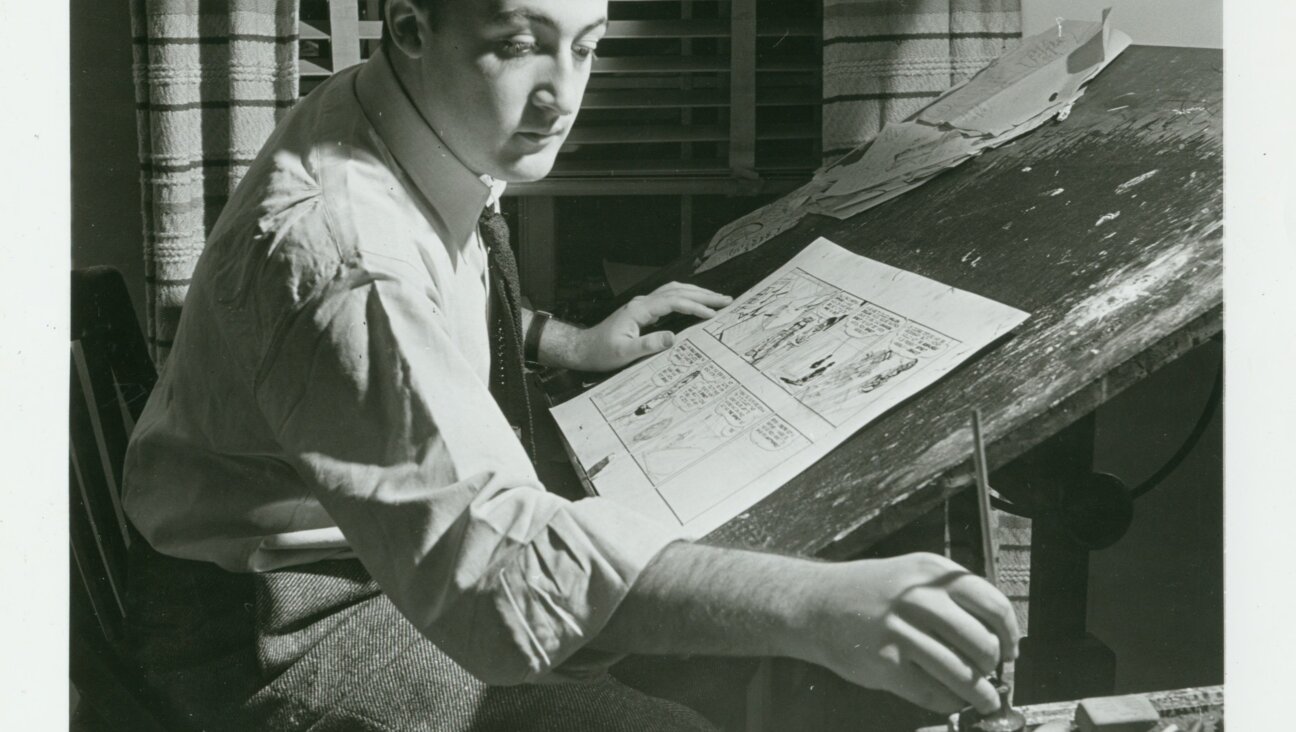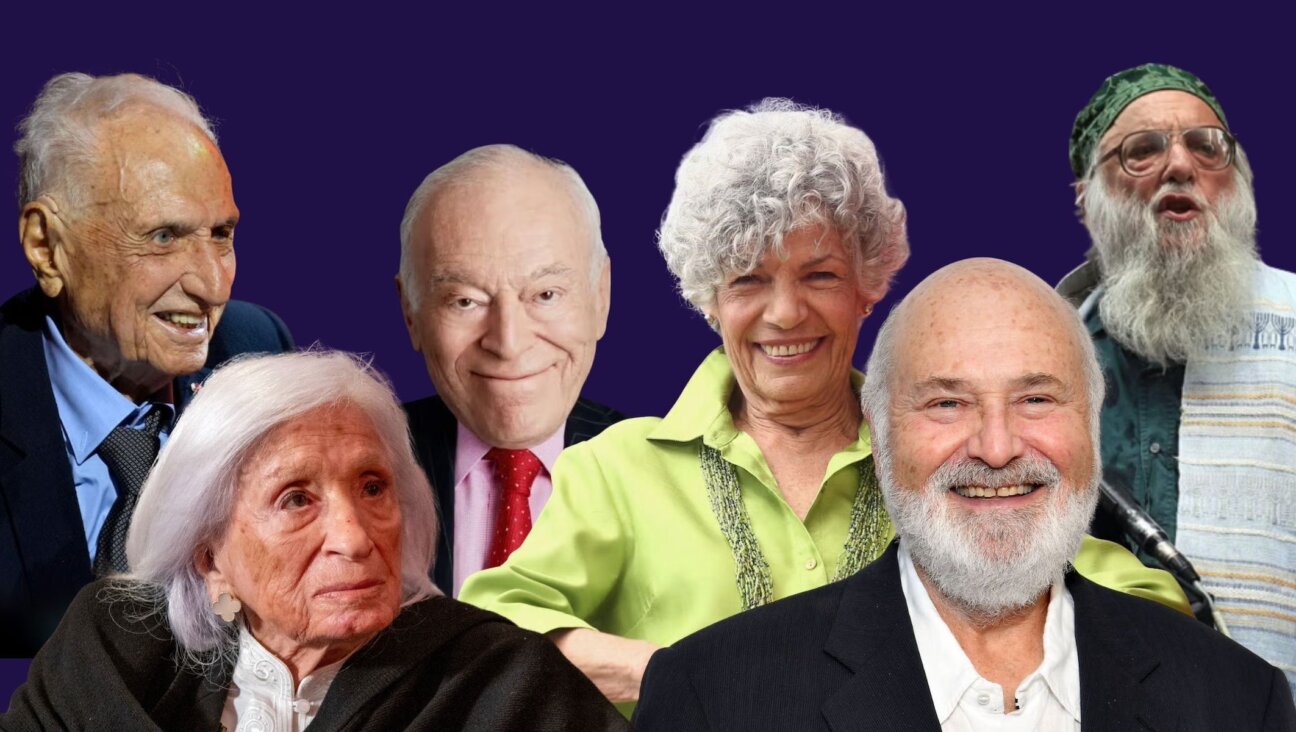There Once Was a Contest for Laughs…
Forward readers are a funny lot. As part of our “Make Us Laugh” contest, readers wrote limericks that explained, illustrated, analyzed or exemplified a Jewish comic sensibility. And they made us laugh.
Entries poured in, from Arizona to Vermont, Illinois to Georgia. Then our panel of comedy judges selected the cream of the crop:
Cathy Ladman won the American Comedy Award for best female stand-up comic, and has gotten laughs for exploring her personal neuroses on “The Tonight Show,” “Politically Incorrect” and in her own HBO special. She has guest-starred on such sitcoms as “Everybody Loves Raymond” and “Just Shoot Me,” and has written for “Roseanne” and “Caroline in the City,” among other television series.
Rob Kutner is an Emmy Award-winning writer for Comedy Central’s “The Daily Show With Jon Stewart.” He also has written for HBO’s “Dennis Miller Live,” as well as The New York Times, Maxim magazine, and yes, even the Forward.
Rabbi Joseph Telushkin is the author of “Jewish Humor: What the Best Jewish Jokes Say About the Jews.” The author of numerous other books, both fiction and nonfiction, he also has written for the television shows “The Practice” and “Touched by an Angel.”
Each judge had personal preferences that the other judges didn’t share, but there were a few limericks that cracked up everyone. The winner was one that all three judges agreed was a solid entry, from Robert A. Fried of Yarmouth, Maine:
Said the Jew to his dog, “Go and fetch.”
The dog replied, “Oy, that’s a stretch!
I’ve got needs of my own.
Gevalt, where’s my bone?”
Asked the landsman, “Did I say to kvetch?”
“I liked that the dog is personified as a Jew, and a complaining one to boot,” Ladman said. “It seemed right.”
Telushkin agreed that it was “a funny way of dealing with traditional complaining, a common Jewish characteristic.”
The author “pours on the Yiddish a little thick,” Kutner said, but he added that “this one is full of fun, surprising, Jewish-esque twists, from the dog speaking right up, to his asserting needs of his own (reminiscent of the classic schnorrer), to the great punch line at the end.”
Fried will be amply rewarded for his deft use of Yiddishisms, with a “Mensch” T-shirt from Shoytz (www.shoytz.com) and two books: “Yiddish With Dick and Jane” by Ellis Weiner and Barbara Davilman, and “Drek: The Yiddish Your Bubbe Never Taught You” by Yetta Emmes.
Several limericks were set in synagogue, including this one by Rabbi Dan Ornstein of Albany, N.Y., which was the second favorite. Was this entry inspired by the rabbi’s personal experience?
A rabbi’s theatric frustration
Propelled him to a comic
oration
But his droll shabbes lesson
Had his tired flock stressin’
For they wanted sermonic sedation!
“I like this one because it observes much about rabbis, congregants and human behavior,” Kutner raved. “It demonstrates the inexorable pull of the Jew toward humor, but grounds it in a typical Jewish setting in which, ultimately, the joke is on the jokester.”
Ladman proclaimed Ornstein’s entry her personal favorite, and added, on a personal note: “When I was a kid, I used to play with the strings on my father’s tallis during the rabbi’s sermon, and many people enjoyed a refreshing nap. Well, the Sabbath is supposed to be a day of rest.”
Ornstein need never write a boring sermon again, because he’ll be receiving two books: “1,001 Jokes About Rabbis” by David Rabeeya, and “A Minister, A Priest and a Rabbi,” a book of humorous sermons by Albert Tapper and Peter Press.
Several readers wrote about major figures in Jewish history, from Moses to Sigmund Freud. But who better for the Humor issue than this bunch of Jewish geniuses, captured by third-place winner Gary Branfman in Victoria, Texas:
Three Stooges heard Mama complain,
“You’ll be doctors if you’re not insane.”
Though their strange sense of humor
Cured nobody’s tumor
It “soytnly” helped ease the pain.
“This is a complete history of the second-generation American Jew in five lines,” Kutner said. “I also like it for outing the Three Stooges (not always listed in the Jewish comedy canon), the use of ‘tumor’ in a comic setting (always a challenge) and the way it actually reconciles the conflict nicely by the end.”
Ladman liked the way the entry broached the subject of Jewish mothers wanting their sons to be doctors, “an icon in Jewish humor.” She also mused: “It would be nice if jokes could make tumors go away. They should look into that more. I’m going to make some calls.”
A Three Stooges DVD collection is on its way to Branfman.
Dating was one of the most popular themes of the submissions, and Roy Baxter of New York City came in fourth with this effort:
When a young Jewish man named Josh
Met Karen, a shiksa from Oshkosh
Though he couldn’t resist her
He knew as he kissed her,
“She ain’t kosher, so I’ll just nosh.”
“This one sets out a classic modern Jewish dilemma, then has the protagonist only come up with a halfway solution,” Kutner said, “then redefines the word ‘nosh’ in a new, amusing, suggestive way — and one that puts its finger right on the dilemma itself.”
Telushkin noted that Baxter’s limerick “reflects more a mindset of 20 to 30 years ago (most Jews today will intermarry), but perhaps reflects the mindset of a more traditional Jew.”
A copy of Wendy Wasserstein’s “Shiksa Goddess” is in the mail to Baxter, plus a copy of “101 Classic Jewish Jokes” by Robert Menchin for good measure.
Shirley A. Shoifet of Millerton, N.Y., took fifth place with this entry:
Laughter is the best medicine, so they say
Better than vitamins taken every day
So tell me a joke
Even fun of me poke
My arthritis will then go away??
Ladman quipped: “Just like a Jew to find the loophole. This person makes a very good case, and in a Yiddish dialect, too.”
To ease Shoifet’s pain, the Forward will be sending her Maeve Binchy’s book “Aches and Pains” and a tube of Bengay.
Five more limericks are worthy of honorable mention, and their authors will be receiving Forward tote bags.
What rhymes with ukulele? Ask Joel Friedman of Orange, Calif., who wrote this:
A musically gifted Israeli
Would pray with a minyan thrice daily
His rabbi said, “Go
Be the Yiddish Don Ho.
Play klezmer on your ukulele.”
A few readers were particularly adept at wordplay, including Jack Pollack of New York City:
There once was a rabbi in Prague
Who snored in his sleep like a frague
He woke up at dawn
And said with a yawn,
“Gotsedanken, I slept like a lague.”
You don’t have to be a New Yorker to appreciate this entry from Marc Silverman of Brooklyn, N.Y.:
Though her language could hardly be gaucher,
Nothing ever got past Sadie Mosher
When at Zabar’s, a goy
Ordered lox, she said, “Oy!
In here, even the goyim keep kosher!”
Pork might be off-limits for observant Jews, but it’s easy to rhyme, and so it popped up in several entries. Here’s the finest of the lot, from Marilyn Liebling in Richmond, Texas:
There once was a man from New York
Who vowed he would never eat pork
One day he was tempted
The vow was exempted
He purchased a new traife fork.
And finally, there’s this one from Hy Rosenfeld of Phoenix, Ariz.:
Our son Izzy was dating a goy
So we sent him out west on a ploy.
Now he dances in a disco
In old San Francisco
And the girl in his arms is a boy.
“It’s well known that Jewish parents have a lot invested in their children marrying Jews,” Ladman said. “So now their son has found a nice Jewish boy. So why aren’t they happy?”















